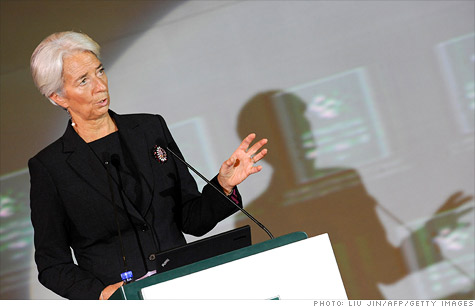
"The global economy has entered a dangerous and uncertain phase," IMF head Christine Lagarde said in Beijing Wednesday.
NEW YORK (CNNMoney) -- Europe is heading for recession. China is battling its own economic demons. And with the United States also facing problems at home (9% unemployment anyone?), it's hardly in a position to help.
Without a white knight to step in and save the day, will we all go down together?
"The global economy has entered a dangerous and uncertain phase," cautioned International Monetary Fund Managing Director Christine Lagarde this morning in Beijing.
"If we do not act, and act together, we could enter a downward spiral of uncertainty, financial instability and a collapse in global demand," she said. "Ultimately, we could face a lost decade of low growth and high unemployment."
Some evidence shows we could already be past that point.
Tuesday, the Conference Board warned world economic growth will remain below its potential for many years to come. Growth is likely to slow to just 3.2% next year, then pick up slightly for a few years, before falling to just 2.7% per year between 2017 and 2025.
"I think Lagarde is being optimistic," said Nariman Behravesh, chief economist for IHS Global Insights. "We're headed for a lost decade anyway."
Even China and India, which have recently enjoyed rapid economic growth, are worried. Following their fifth so-called financial dialogue on Wednesday, the two countries issued a strongly worded statement diagnosing the global economy as in a "critical phase" and urging "strengthening of international policy."
Two weeks ago, European leaders agreed to boost the lending power of the region's bailout fund. But that's done little to boost confidence. Since then, Italy's borrowing costs have surged and Greece's debt crisis has remained in the spotlight, forcing prime ministers of both countries to agree to resign from their positions down the road.
Meanwhile, the U.S. is still struggling to recover from its own financial meltdown three years ago. While company earnings have bounced back, Americans are seeing little relief amid 9% unemployment and a still-slumped housing market.
As headlines focus on the bickering between presidential candidates, Congress has yet to pass a meaningful jobs bill and the Super Committee is fast approaching its deadline to agree on $1.2 trillion in spending cuts.
Though most economists are not predicting another recession for the United States, not enough is known about American exposure to Europe's debt crisis.
"If we learned anything in 2008, it's that we don't know what we don't know about the linkages," said Carl Weinberg, chief economist for High Frequency Economics. "We think that American banks are adequately capitalized to withstand any shock from Europe, but we are also watching for those unexpected results."
The one bright spot in this mess seems to be China's still robust economic growth. But even the world's second largest economy is not insulated completely from external shocks.
Weaker demand from abroad is already hurting Chinese exports and is expected to continue to weigh on their manufacturers. Meanwhile, the Chinese government continues to struggle with a delicate balance of letting the air out of its real estate market, without stifling growth.
The silver lining here, is that new data out Wednesday show inflation has started to cool in China. That could give policymakers more leeway to focus their efforts on stimulating their economy in the event of a global slowdown.
But don't expect the Chinese to rush to everyone else's rescue.
"China is not going to bail out Europe. It's not going to bail out the U.S.," said Behravesh.
If leaders in Europe and the U.S. can't swiftly solve their own problems, how can anyone expect agreement across the continents?
"You should not expect miracles in international coordination," said Bart van Ark, chief economist of The Conference Board. ![]()
| Overnight Avg Rate | Latest | Change | Last Week |
|---|---|---|---|
| 30 yr fixed | 3.80% | 3.88% | |
| 15 yr fixed | 3.20% | 3.23% | |
| 5/1 ARM | 3.84% | 3.88% | |
| 30 yr refi | 3.82% | 3.93% | |
| 15 yr refi | 3.20% | 3.23% |
Today's featured rates: